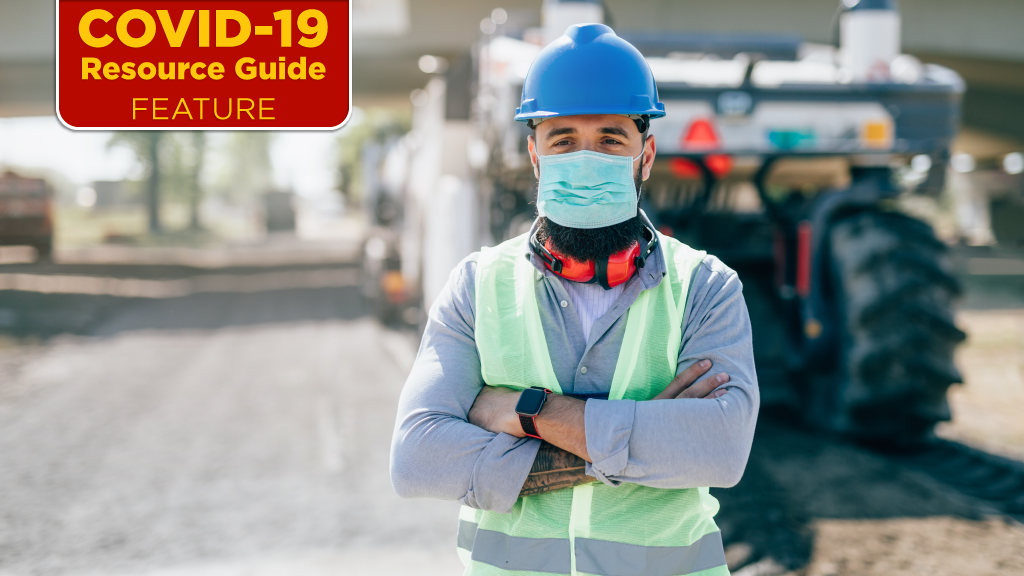It’s been a long road for the Ontario Road Builders’ Association (ORBA) and its member firms from the outbreak of COVID-19 in Canada in early 2020 to the emphasis on double vaccinations.
“Like everyone else we were blindsided. They were no guidelines on how to deal with the pandemic,” says ORBA president Rocky Coco, who also is president of Coco Paving Inc.
At the same time, the association and its members “lobbied hard” to avoid a provincial government shutdown of road construction, arguing that it was an essential business, he says.
Road contractors did an “exemplary job” in coping with the pandemic, says Coco, who estimates they lost an average $150-per-day-per-worker from additional costs such as purchasing safety equipment and lost productivity from enforcing social distancing.
In addition to conducting on site safety procedures — such as daily screening of workers — they adhered to government and public health policies and guidelines and followed the recommendations of its own association, say Coco.
“Every morning I chaired a meeting of our COVID Response Team,” says ORBA chief executive officer Bryan Hocking on the actions the association knew had to be taken as the entire country went into lockdown.
Comprised of himself and the directors of stakeholder relations and marketing and communications and their support staff, the five-member team assessed the various government and public health pronouncements directive which “were coming out fast and furious” and then sent out daily bullet points to its members.
The morning assessment meetings have continued throughout the pandemic, although have narrowed down to three days and include non-COVID subjects.
Along with government and public health directives, the material and other information was also posted to association’s website and was the basis for the publication on of a COVID-19 Best Practices Asphalt Industry Best Practices Guide by the Ontario Asphalt Pavement Council, a council of ORBA representing the asphalt manufacturing and installation sector.
Work on the guide began in April in 2020 and then released in June, says Hocking, acknowledging the work of technical director Doubra Ambaiowei and OPAC’s plant and paving committee for its creation.
Distributed electronically to all ORBA members, the four-page document included a list of measures for restricting the spread of the pandemic. Some were standard practices which would apply to any business, such as the need for frequent handwashing and adhering to social distancing.
Others were more specific to the industry, including emphasizing the importance of electronic ticketing and asking third party haulers to remain in their trucks at construction sites. Another recommendation was that asphalt samples should be bagged and tagged.
“At no point did employers or their employees pushback against those recommendations,” says Hocking, adding that the “road building industry reacted very quickly and went above and beyond,” industry guidelines and government regulations.
Road builders developed their own set of protocols and were “quite innovative” in implementing on site safety measures. Some examples include setting up mobile wash stations, sanitizing equipment at the beginning and end of shifts, and installing Plexiglas between the front and back seats in trucks, he says.
Focusing on the issues of return-to-work policies vaccinations, Hocking notes that ORBA’s head office in Mississauga reopened in early September. But anyone entering the building has to be double vaccinated. Based on feedback the association has been receiving, some of its member firms are also enforcing similar restrictions for their office environments.
On the construction sites the situation is a little different. Not only are there more people on those sites, some unions are in favour of mandatory vaccinations, while others are not. A recent ORBA study revealed the number of vaccinated versus non-vaccinated workers roughly corresponds to national figures, he says.
It would be easier for the industry if the province would implement across-the-board regulations that apply to all businesses. Echoing comments other association and business leaders have made, Hocking says the differing policies: “gets a little confusing. But we realize the government is in a difficult position.”
At the same time, there is no confusion on how a recently implemented direction by the City of Ottawa will impact all contractors in that municipality, says Hocking.
In early September that city implemented mandatory vaccine policy that requires all employees, volunteers, students, and outside contractors to be fully vaccinated against COVID-19 by this Nov. 1.



Recent Comments
comments for this post are closed